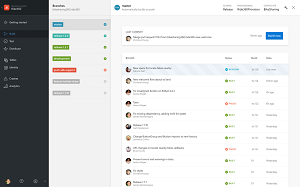News
Microsoft Previews Visual Studio Mobile Center: 'Mission Control' for Apps
- By David Ramel
- November 16, 2016
Microsoft introduced a preview of the cloud-based Visual Studio Mobile Center during its Connect(); 2016 conference today, offering services for building and managing iOS and Android mobile apps.
The company described it as "mission control" for mobile apps written in Swift, Objective-C, Java, Xamarin and React Native. Demonstrating the company's new commitment to openness and interoperability with other platforms, the Mobile Center was unveiled with support for Apple technologies but not the Universal Windows Platform (UWP), which is upcoming in future versions, along with Cordova support.
Microsoft said the Mobile Center is a next-generation product based on its current developer services such as HockeyApp -- which provides crash analytics and beta distribution service -- and Xamarin Test Cloud, used by developers to test app functionality across hundreds of devices.
Considering its roots in the Xamarin service, Mobile Center was appropriately introduced by Microsoft mobile exec Nat Friedman, a co-founder of Xamarin Inc., which was acquired by Microsoft earlier this year.
 [Click on image for larger view.]
Visual Studio Mobile Center (source: Microsoft)
[Click on image for larger view.]
Visual Studio Mobile Center (source: Microsoft)
"Delivering excellent mobile experiences requires going beyond frameworks and IDEs—developers also need services to continuously build, test, distribute, and monitor their apps so that they can quickly iterate and improve," Friedman said in a blog post. "Many teams cobble together a workflow using some of these services from different tools and products. But this is time-consuming and distracts you from your actual mission of delivering a great app.
"This is why we built Mobile Center: a mission control for mobile apps that brings together all the cloud and lifecycle services that help developers deliver high quality apps faster. You can build, test, distribute, and monitor your apps and easily add backend cloud services to scale your app to millions of users on demand."
Using the Mobile Center, developers can automate the lifecycle of their apps, leveraging services for continuous integration, automated testing, distribution, crash reporting, analytics and user feedback. Azure Services can be used to implement a back-end for mobile apps, providing services such as authentication, authorization, Table Data Storage and offline synchronization of data. Social identity services include Facebook, Google, Microsoft and Twitter, while enterprise identity is handled with Azure Active Directory.
As an early preview, much functionality is absent at this stage. For example, the Mobile Center's app build service -- which automatically processes builds upon a pull request -- only works with apps that are hosted in a GitHub repository. "While in public preview, we are constantly adding features and further platform support," says the Mobile Center documentation. "If you are developing a mobile app in a platform that is not supported, chances are our team is working on it. Don’t hesitate to contact us and let us know more about your needs."
The preview is accessible by invitation only, and Microsoft has provided a sign-up page in which developers are asked about what language and platform they are using, source code repository and so on. After developers receive an invitation, they can log in to Mobile Center using Microsoft, GitHub or HockeyApp accounts.
Along with Cordova and UWP support, future versions of Mobile Center will provide more cloud-based services such as push notifications and advanced analytics.
About the Author
David Ramel is an editor and writer at Converge 360.